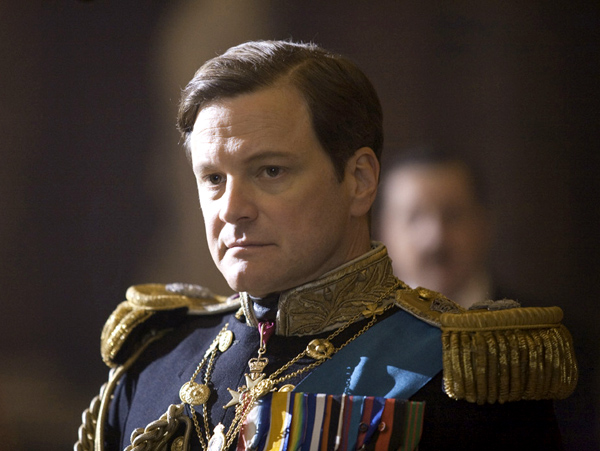|
Reviews of Recent Independent, Foreign, & Documentary Films in Theaters and DVD/Home Video

THE KING’S SPEECH
Here’s the backstory: the aging George V’s two sons are the stammering Albert (nicknamed Bertie) and his dashing older brother Edward, who is next in line for the throne but busy having an affair with a twice-divorced Baltimore woman, Wallis Simpson—certainly not queenly material. After George V dies, Edward becomes King Edward VIII and begins partying like it’s 1999 to the royals’ embarrassment, and soon he decides to abdicate, choosing his American gal over his country. Now that Bertie unexpectedly becomes George VI, he must conquer his stammer if he wants to be seen as kingly material. Although it sounds like a dully respectable Masterpiece story with stiff-upper-lip royals acting cluelessly prissy for us punters’ amusement, director Tom Hooper and writer David Seidler have taken the shackles off such Oscar-bait storytelling, creating a compelling, even exciting audience pleaser. It’s still awards bait, but it’s so royally entertaining that that doesn’t matter. What puts The King’s Speech several notches above standard awards contenders, like Atonement, is its welcomed irreverence. The movie opens with Bertie stumbling his way through an important public speech, which prompts his wife, Princess Elizabeth (better known as the future Queen Mother), to look for a way to cure his speech impediment. In attempting so, Bertie stuffs marbles in his mouth and smokes profusely in misguided attempts to end his stuttering. Hooper and Seidler’s cheeky style perfectly fits the unconventional angle from which they view their subject. The royals, though given due respect, are shown having real problems like everyone else, and they might need the help of a “commoner” to solve them. That savior arrives in the form of Lionel Logue, a middle-aged Australian expatriate living with his wife and two sons in a working-class London neighborhood, and whom the princess first visits as a last-ditch effort. A lively sort and a sometime actor—he auditions for the title role in Richard III only to be told he’s not young enough, which is an understatement—Lionel’s experience makes him very confident in his ability to cure speech problems. His working with Bertie occasions no false piety on his part: he acts as if he and the king are good buddies having a pint at the pub. Bertie, of course, is first put off and storms out, uneasy by such unorthodoxy, which (after his return) includes an exercise in which Lionel encourages Bertie to shout out various curse words which are usually beneath any good royal, but which Lionel considers valid stuttering treatment. The two men’s eccentric relationship climaxes when the teacher prepares his student for the most important speech of his life: telling his subjects throughout the British Empire on a live radio broadcast that they are now fighting Hitler for the very future of the free world. Hooper underlines this exhilarating sequence with the rhythmic second movement from Beethoven’s Seventh Symphony, a wittily ironic choice, for Beethoven was Germanic to the nth degree and was one of Hitler’s favorite composers. The piece is also a noticeable change from Alexandre Desplat’s sparingly used and effective score. The acting puts The King’s Speech over the top. Performers seen briefly, like Michael Gambon (George V), Claire Bloom (Queen Mary), Eve Best (Wallis Simpson), and Jennifer Ehle (Lionel’s wife Myrtle), register strongly. Derek Jacobi is properly stentorian as Archbishop of Canterbury Cosmo Lang, whose influence over the new king wanes when Lionel is around. Guy Pearce perfectly embodies a carefree George V so bent on his relationship with Wallis that he’s visibly relieved when he finally abdicates, and Helena Bonham Carter’s Elizabeth mixes rapier wit with a sturdy backbone. The two lead actors are so good that any awards talk becomes superfluous. Such towering performances will outlive this awards season, so who cares if they win or not? Geoffrey Rush’s tendency toward brazen hamminess (as his recent Tony-winning effort in Ionesco’s play Exit the King proved) plays right into the hands of Lionel, who’s prone to the outsized gestures that the actor abounds in. But Rush can also slow the tempo down, and Lionel’s quieter scenes with Bertie—in which a helpful friend is allowed to be privy to royal intimacies—are stellar examples of underplaying. Equally
good, Colin Firth amazingly conveys the human side of Bertie while
keeping his royal dignity intact, especially in the amusing scenes when
Bertie goes along with Lionel’s goofy exercises. Firth is also
understatedly moving in the film’s profoundly dramatic scenes. Where
other actors would do too much, he allows his face to become an almost
blank slate, whose minute changes in expression convey more than any
obvious mugging would. With Rush and Firth (and Lionel and Bertie)
complementing each other so beautifully, The King’s Speech is
simply one of the best movies of the year.
Kevin Filipski
|

